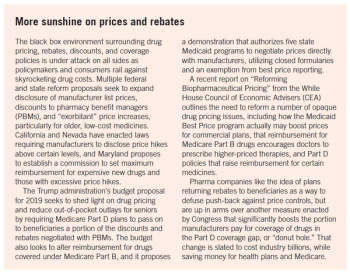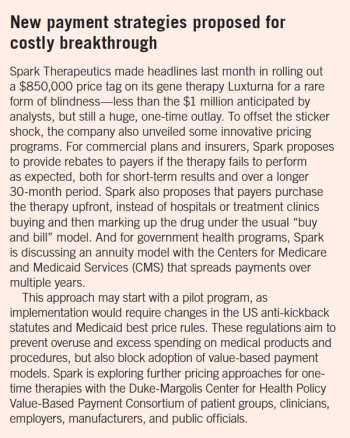
FDA is joining with other federal health agencies and the biomedical research community to advance the science, regulatory policies and reimbursement strategies to support innovative new medicines to combat infectious diseases.
Jill Wechsler is Pharm Exec's Washington Corespondent

FDA is joining with other federal health agencies and the biomedical research community to advance the science, regulatory policies and reimbursement strategies to support innovative new medicines to combat infectious diseases.

With the rise in industry programs for developing biosimilars, tensions are high as innovator firms back strategies that appear designed to delay competition. Jill Wechsler reports.


To help combat the nation’s opioid epidemic, FDA is promoting a more tailored approach to developing and testing effective analgesics, with the aim of bringing less addictive pain treatments to market more quickly.

New Action Plan aims to streamline development, but rebates and reimbursement block market access.

A wave of potentially impure drugs and APIs from China, India, and other foreign firms has prompted recalls and FDA warning letters.

The Senate has approved several multi-agency budget bills for the coming fiscal year that boost funding for FDA and the NIH – and include a contentious provision that requires biopharma companies to disclose product prices in direct-to consumer advertising.

Just as biopharma companies are mastering the complexities of the five-year-old federal Open Payments program, state governments are enacting a host of additional marketing and disclosure rules and restrictions on industry interactions with health care professionals.

New Action Plan aims to streamline development, but rebates and reimbursement block market access.

Scott Gottlieb is proposing to flatten out FDA’s structure by having Center directors report directly to him, giving more authority to the agency’s six product regulatory Centers and to the Office of Regulatory Affairs.

Rising pressure to access less expensive prescription medicines available overseas is prompting the Trump administration to explore flexible import policies, reports Jill Wechsler.

Streamlined clinical research, more guidance speed new cures to patients.

FDA has finalized a more flexible policy for how biopharma companies may discuss payments, outcomes and healthcare economic data with payers, formulary committees and other audiences with expertise in drug prescribing and coverage.

Azar and Gottlieb out front in revising rebates, restructuring Medicare, and promoting competition.

Pressure to assess and approve a growing volume of promising new drugs and biologics in accelerated timeframes is prompting a major reorganization of CDER's Office of New Drugs.

Right-to-Try bill sent to White House for President’s signature after passage by Congress.

After months of expectations and repeated delays, President Trump formally announced his strategy for making prescription medicines more affordable and accessible in the U.S.

The use of more targeted therapies is expanding as the public gains access to low-cost genetic testing, and more advanced computer systems are offering data from healthcare systems.

Pharm Exec interviews the FDA commissioner, who is building support by combating opioid abuse and advancing innovation.

FDA officials make efforts to better manage the increasing amount of applications for new drugs that treat disease in innovative ways and include new kinds of clinical research, starting with a plan to restructure the Office of New Drugs (OND) in the Center for Drug Evaluation and Research (CDER).

FDA is moving slowly in liberalizing off-label communications amid outrage over opioid promotion.

FDA is moving slowly in liberalizing off-label communications amid outrage over opioid promotion. Jill Wechsler reports.

After months of delay, Congress finally passed a $1.3 trillion omnibus budget bill March 22, 2018, just in time to avoid another government shut-down.

As part of FDA initiatives to reward innovation and promote patient access to medicines, the agency is working hard to support the development of high quality biosimilars and interchangeable products, Scott Gottlieb told a conference on March 7.

The public and policymakers seek more transparency in pricing and product development.

Advocates on all sides applauded the request to increase funding significantly for FDA under the Trump administration’s budget for fiscal year 2019.

Commissioner Scott Gottlieb has outlined FDA plans to continue the fight against opioid addiction and to prepare a “comprehensive plan” to bolster the market for biosimilars.

Low-cost follow-ons and biosimilars please payers but heighten competitive battles with brands.

Amidst the continuing clamor for government action to curb prescription drug prices, a more collaborative effort aims to broaden the debate to consider the full range of health care services and rates that affect spending in this area. Jill Wechsler reports.

In his State-of-the-Union address this week, President Trump continued his harangue about unfair drug prices in the U.S., but he surprised many observers by failing to call for full repeal of the Affordable Care Act.